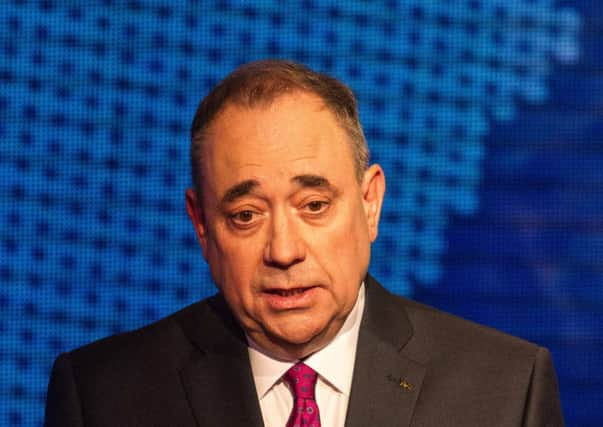Independence currency plan could see banks leave


The claim was made on another damaging day for Alex Salmond, which saw his aides admit that there was an embarrassing error in the document he used to set out and defend his currency plans.
New research by experts at the National Institute of Economic and Social Research (NIESR) warned UK regulators and the banks’ shareholders would demand that major institutions seen as “too big to fail”, like RBS and Lloyds, would need to be headquartered in the UK after independence.
Advertisement
Hide AdAdvertisement
Hide AdThe move south of the Border would be required to ensure the Bank of England stands behind them as “lender of last resort” in case of another crash.
NIESR experts argued that another alternative – a new Scottish currency – could allow the fledgling state to protect the country’s financial giants and provide real economic freedom from London.
The NIESR report was published as the First Minister came under fresh pressure at Holyrood yesterday to set out his Plan B for currency after independence.
His proposal for a sterling union is currently being ruled out by the UK Government.
The SNP leader’s troubles continued yesterday when the chairman of the Yes campaign, Dennis Canavan, confirmed in an online question-and-answer session that he thought Scotland should have its own currency.
A so-called “sterlingisation” approach, which would see Scotland simply use the pound informally, is widely seen as the preferred second option.
Yesterday’s report, titled Scotland’s Lender of Last Resort Options, warned the estimated £92 billion of debt which Scotland would inherit from the UK will make it difficult for a fledgling Scottish Government to build up the reserves to bail out the massive financial sector.
During his attempts to defend himself, Mr Salmond repeatedly referred to page 110 of the Scottish Government’s white paper, which he said set out his plans to share the pound.
Advertisement
Hide AdAdvertisement
Hide AdLater, however, his spokesman was forced to admit that page 110 contained a mistake.
The offending page referred to the Scotland using a “pegged” or “flexible” sterling, but these terms were not applicable to sterling and should have referred to the creation of a new Scottish currency.
Treasury Secretary Danny Alexander said the report shows dollarisation would be “damaging for a separate Scotland’s economy and a terrible choice” for the country’s financial sector.
Mr Salmond came under pressure over the issue during First Ministers Questions at Holyrood with opposition leaders insisting he was “not being fair” with the people of Scotland by failing to set out a Plan B.